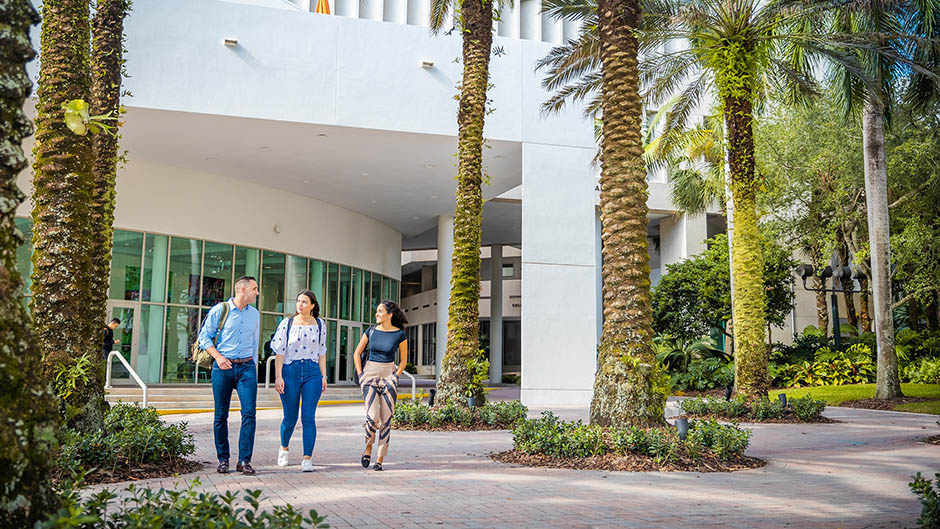As the business world continues to grapple with rapid changes under the COVID-19 pandemic, incoming Full-Time MBA students receive a redesigned curriculum strengthened to deliver the necessary tools to meet the demands of today’s more data-driven workplace unfolding under local, regional, and global uncertainty. The launch of Miami Herbert’s renovated flagship program this fall comes after an exhaustive evaluation that began in 2019, well before the onset of the health crisis.
“Even before COVID, we already felt that the world had changed so much and that it was a critical moment to take a good look at the curriculum,” says Professor of Business Law Patricia Abril, formerly vice dean for graduate business programs who oversaw the redesign process. “We were thinking about what comes next. What should we be teaching students? What is the ideal program for students entering the workforce in one, three, or five years?”
The questions prompted the formation of a faculty-led redesign task force and theme committees that carried out comprehensive assessments, which included feedback from peers, students, recent grads and established alumni, board members, and recruiters.
“We put together all of the wisdom gathered and the faculty designed a program that we are very proud of,” Abril says.
Students will receive the same high-caliber training and strength of knowledge in a 56-credit, 21-month format, but with a curriculum more richly geared towards enhancing skills in three main areas: critical thinking and decision making with data, leadership and working in teams, and innovation and strategy. Faculty within the themes will meet periodically to ensure consistency and effective progression of knowledge as classes build upon each other. Technology-themed courses will also be offered throughout the curriculum as one-credit classes that will likewise supplement each other.
“An essential element of the program is that the professors also work in a team environment, and each has a role in taking the students on the next mile of the journey,” Abril explains.
To complement the objectives, 16 new and refreshed courses now form part of the core content, implementing dynamic topics in technology, AI, negotiation, and design thinking. Faculty throughout departments also set out to refresh all general core courses, which now carry organized, coordinated content under the three main themes, as well as more team- and project-based assignments.
In addition, beneficial boot camp-style courses during orientation present introductions to stakeholders in business and career development. Students will move on to take electives earlier in the curriculum, which will allow for a four-credit project semester in their second year to consist of consultancy or entrepreneurship activity with an actual company.
“Recruiters are no longer just looking at students’ grades and how well they did in their academic classes,” Abril states. “They want to know about a real-life problem that a student has helped solve, or a business issue that they have overcome.”
Students will be able to choose from a menu of project options by industry or other interest, with a focus on practical scenarios in which they may both learn and provide help. In January of 2020, for instance, students traveled to the Bahamas to help business owners rebuild their businesses after Hurricane Dorian.
The renovated program’s emphasis on data analysis and technology and innovation has enabled STEM designation, which has helped place Miami Herbert as the business school with the most STEM-certified graduate programs in Florida. Full-Time MBA students will become equipped with the data and analytical skills needed for high-tech positions in the core areas of science, technology, engineering, and mathematics.
All innovations—including a lighter final term for an earlier start to job searching—mark an increased priority towards career readiness and outcomes especially in an irregular environment.
“We can’t predict what the next uncertainty is going to be,” Abril states, highlighting that COVID-19 represents only one possibility. “It could be inflation, a natural disaster, or something else, but when you know how to lead and how to make decisions with data, whatever the crisis may be, you can weather it.”
Acknowledging uncertainty as a “fill in the blank” variable, Abril and faculty teams have achieved a purposeful, time-relevant program that will prepare future leaders to expect, face, and manage unforeseeable conditions in a business setting.

